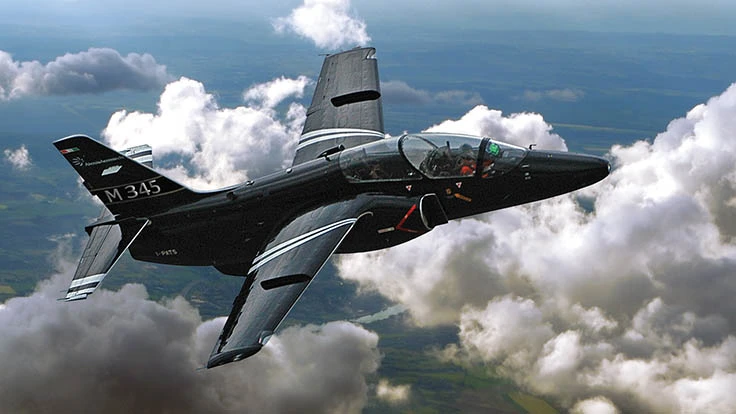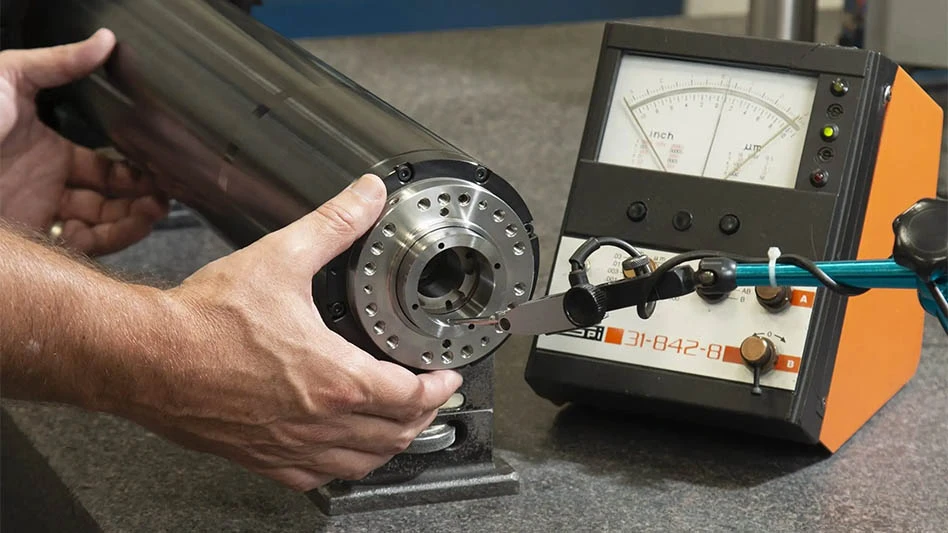
Rome, Italy – The prototype of the new Aermacchi M-345HET (High Efficiency Trainer) two-seat basic jet trainer has successfully completed its first flight from Venegono Superiore airfield at Varese, Italy, on Dec. 29, 2016. The aircraft was flown by Quirino Bucci and Giacomo Iannelli from Leonardo Aircraft Division.
Quirino Bucci, project test pilot trainers of Leonardo Aircraft Division, expressed great satisfaction at the end of the 30-minute flight and said: “The aircraft conducted itself perfectly, meeting the expectations of the design parameters while showing excellent performance. The engine in particular demonstrated a great capacity to react to regime changes, which is a fundamental characteristic for a basic training aircraft.”
The M-345 is the latest-generation aircraft from Leonardo for military pilot training, offering reduced acquisition and life-cycle costs. As a replacement for the current Italian Air Force MB.339A fleet, it will also re-equip its famous “Frecce Tricolori” aerobatic team.
The M-345HET test campaign will be completed within 2017. The next tests will check the advanced avionics systems, the engine, and the flight envelope expansion, including altitude, speed, and maneuverability.
Modern avionics, considerable external load-carrying capability on the wing pylons, and performance make the M-345HET also suited for operational roles. Lifecycle cost reduction is driven by long fatigue and two-level maintenance, the latter made possible by replacing expensive general overhauls with the airframe and systems’ Health and Usage Monitoring System (HUMS). The avionics, based on the latest M-346’s experience, matches the standards of the latest combat jets, including hands on throttle and stick (HOTAS) controls, head up display (HUD), multi-function displays (MFD), and real-time data link. The aircraft is powered by a Williams FJ44-4M-34 turbofan engine with thrust of 1,540kg (3,450 lb). Single-point pressure refueling and the on-board oxygen generation system (OBOGS) reduce ground support crews and ground operation times.
Multinational aerospace, defense, and security company Finmeccanica, headquartered in Rome, Italy, changed its name to Leonardo S.p.a. effective Jan. 1, 2017.
M-345HET
Wing span 8.47m (27.78ft)
Length 9.85m (32.32ft)
Height 3.74m (12.27ft)
Wing area 12.6m2 (135.6ft2)
Take-off weight (trainer) 3,300kg (7,275 lb)
Take-off weight (max) 4,500kg (9,920 lb)
Internal fuel 700kg (1,545 lb)
Max level speed (SL/20kft) 380/420 KTAS
Rate of climb (SL) 5,200ft/min
Service ceiling 40,000ft
Source: The Leonardo Co.
Quirino Bucci, project test pilot trainers of Leonardo Aircraft Division, expressed great satisfaction at the end of the 30-minute flight and said: “The aircraft conducted itself perfectly, meeting the expectations of the design parameters while showing excellent performance. The engine in particular demonstrated a great capacity to react to regime changes, which is a fundamental characteristic for a basic training aircraft.”
The M-345 is the latest-generation aircraft from Leonardo for military pilot training, offering reduced acquisition and life-cycle costs. As a replacement for the current Italian Air Force MB.339A fleet, it will also re-equip its famous “Frecce Tricolori” aerobatic team.
The M-345HET test campaign will be completed within 2017. The next tests will check the advanced avionics systems, the engine, and the flight envelope expansion, including altitude, speed, and maneuverability.
Modern avionics, considerable external load-carrying capability on the wing pylons, and performance make the M-345HET also suited for operational roles. Lifecycle cost reduction is driven by long fatigue and two-level maintenance, the latter made possible by replacing expensive general overhauls with the airframe and systems’ Health and Usage Monitoring System (HUMS). The avionics, based on the latest M-346’s experience, matches the standards of the latest combat jets, including hands on throttle and stick (HOTAS) controls, head up display (HUD), multi-function displays (MFD), and real-time data link. The aircraft is powered by a Williams FJ44-4M-34 turbofan engine with thrust of 1,540kg (3,450 lb). Single-point pressure refueling and the on-board oxygen generation system (OBOGS) reduce ground support crews and ground operation times.
Multinational aerospace, defense, and security company Finmeccanica, headquartered in Rome, Italy, changed its name to Leonardo S.p.a. effective Jan. 1, 2017.
M-345HET
Wing span 8.47m (27.78ft)
Length 9.85m (32.32ft)
Height 3.74m (12.27ft)
Wing area 12.6m2 (135.6ft2)
Take-off weight (trainer) 3,300kg (7,275 lb)
Take-off weight (max) 4,500kg (9,920 lb)
Internal fuel 700kg (1,545 lb)
Max level speed (SL/20kft) 380/420 KTAS
Rate of climb (SL) 5,200ft/min
Service ceiling 40,000ft
Source: The Leonardo Co.
Latest from Aerospace Manufacturing and Design
- JetZero all-wing airplane demonstrator achieves milestones
- Cermet indexable inserts for medium turning operations
- Trelleborg acquires Aero-Plastics
- Industrial automation products, enclosed encoders
- #61 - Manufacturing Matters: CMMC roll out: When do I need to comply?
- AIX shows aircraft interiors are a strategic priority for global airlines
- Machine Tool Builders Roundtable: Turn equipment into expertise
- No time to waste: How to machine MedTech parts more efficiently





